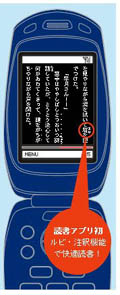One of the fun parts of the Symposium this wekeend was seeing Brewster Kahle talk about stuff. He started out by talking about this book Libraries of the Future that he wanted to scan and put on the Internet Archive. He then talked further about how figuring out who owned the copyrights for it was a total pain in the ass. I’m not even sure if he ever did figure it out; he even had MIT’s librarians working on it. The book is online anyhow. I haven’t looked at books in the Open Library project in a while but how slick is this? Full and slightly messy text here which, amusingly, ends with: PLEASE DO NOT REMOVE CARDS OR SLIPS FROM THIS POCKET.
“I’m a librarian. What I am trying to do is bring all of the world’s knowledge to as many people as want to read it. The idea of using technology is perfect for us.” Brewster Kahle gives a twenty minute talk about free culture and libraries and digitzation at TED.

By: Jessamyn West,
on 5/31/2008
Blog:
librarian.net
(
Login to Add to MyJacketFlap)
JacketFlap tags:
libraries,
links,
work,
me!,
vermont,
brewsterkahle,
royalton,
stevecisler,
ubuntu,
Add a tag

People have been sending me some great links which I’ve been consolidating for a “best of inbox” post here today. This is a rainy Vermont weekend coming up which means indoor projects and I’m waiting for the kitchen floor to dry.
The above image is from the Royalton Library up the road from here. I went there on Wednesday after recording the MetaFilter podcast. The librarian had a patron who had gotten a “free” computer (actually two) and needed help setting it up. I went over with Ubuntu CDs and a cheery frame of mind. That outlook soured somewhat when I learned more about the computers. They were given to this family by the VT Department of Children and Families. They were, I think, donated to them. Neither one worked right — one had no operating system (and a possibly broken CD drive) and one froze intermittently. DCF had given these computers to this family, this family already needing a bit of help, as a way of helping them out. All they wound up doing was giving them a project, a somewhat futile project. The mom and daughter were good natured about it, but I felt totally on the spot — if I fixed the computers, the family would have a computer. I took them home to mess with and I’ll probably just replace them with a working computer from my attic. What a pickle.
On to the links I’ve assembled.
That’s the short list for now, I have a few that are begging for more explication which I’ll be getting to shortly.
 How do you tell stories on a cellphone screen? You should figure it out.
How do you tell stories on a cellphone screen? You should figure it out.
The Poynter Institute has a fascinating article about mobile journalists that are bopping around the world with laptops, cameras, and a notebook. While journalist Pat Walters sees some dangers in the practice, the article links to plenty of sweet storytelling experimentation. Check it out:
"At The News-Press, that means deploying a team of MoJos armed with laptops, cameras and recorders. At the Post, Ahrens says, it means hiring newspaper Web site designer Rob Curley, known nationwide for his groundbreaking work in creating an intensely local and interactive Web site for the Naples (Fla.) Daily News and the Lawrence (Kan.) Journal-World."
For the novelists in the audience, the Wall Street Journal has covered the evolution of mobile phone fiction. In addition, the Institute for the Future of the Book has a great essay about the future of the cellphone novel in America, speculating if the bitty-text wave could affect us. Read it and weep:
"In other words, improved telcom services in the States wouldn't necessarily translate into a proliferation of cellphone novels, but other mobile media services would undoubtedly start to flourish. Broadband internet access is also pathetically slow in the US compared to countries in Europe and East Asia—the Japanese get service eight to 30 times faster than what we get over here."

 The word for the week is "mobile."
The word for the week is "mobile."
Over the weekend, I met one of Reuter's first mobile journalists. These reporters are armed with powerful videocamera phones and portable hardware--a single reporter can create print and video features miles from any newsroom.
The experimental Mobile Journalist Toolkit includes a portable tripod, computer keyboard, a directional microphone, and the Nokia N95 cell phone.
The United States is lagging behind other countries in adapting to cell phone possibilities, but the change is coming.
Last week, the MediaShift Idea Lab explored the slow transition to mobile media, offering ideas for writers interested in using this new medium. Paul Lamb writes: "According to a just released report by Jupiter Research, only 16% of U.S. subscribers are browsing the mobile web. According to the report, the low uptake is due primarily to lack of interest (73%) and the high cost (47%)."
The change is coming, it's just taking longer for Americans. Someday soon, the mobile phone market will be begging for content. The journalists who can figure out how to write for this bitty medium can take their pick of stories.
How will you write and report for the smallest screen of all?





 How do you tell stories on a cellphone screen? You should figure it out.
How do you tell stories on a cellphone screen? You should figure it out.
[...] Jessamyn] Bookmark the permalink. Trackbacks are closed, but you can post a comment. « National [...]